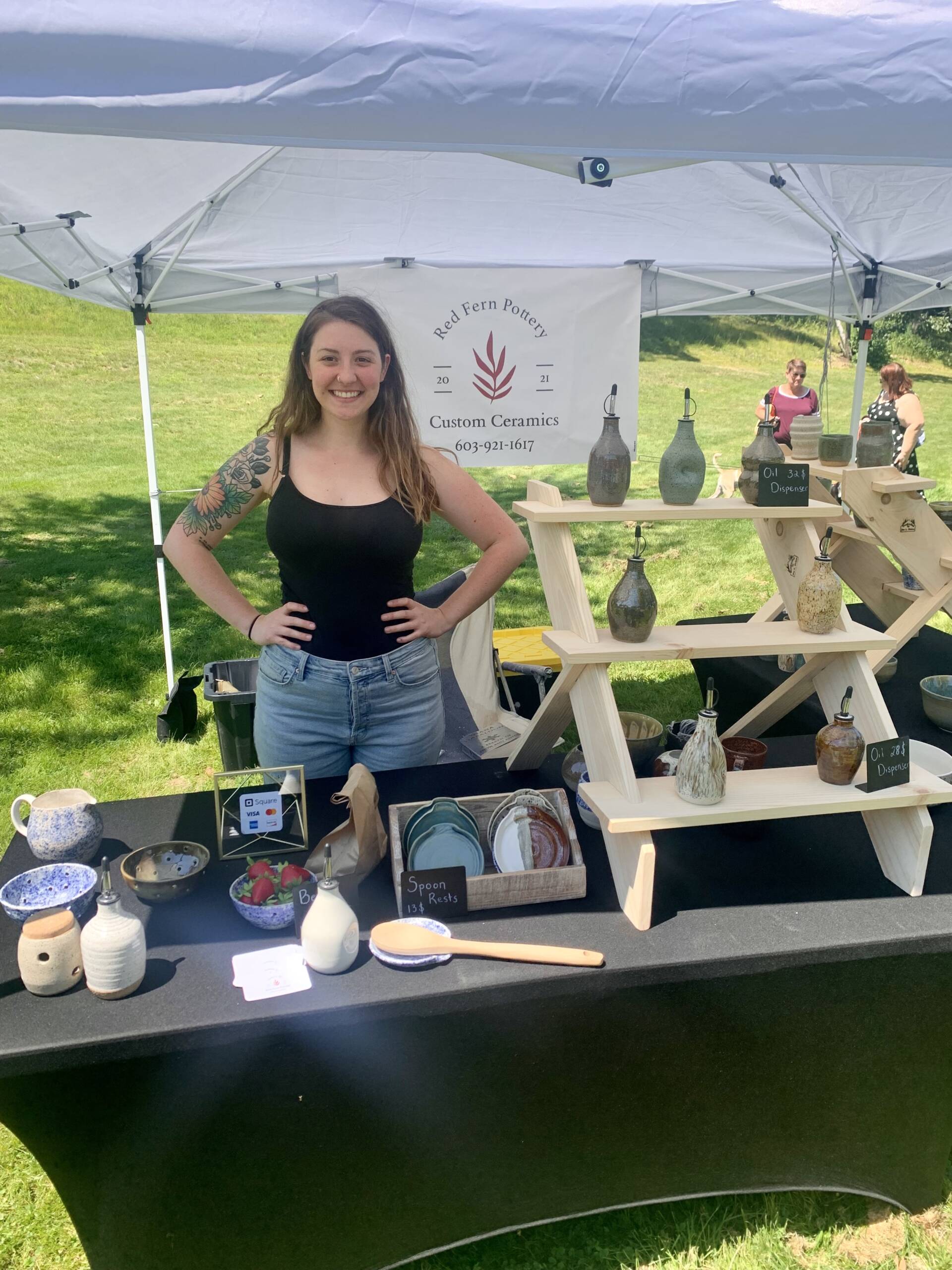

The images of container ships sitting idly in ports around the world amid severe supply chain issues have consumers and business owners scrambling during what is now the height of the holiday buying season.
Consumers have to worry about whether what they want is even in stock, and if it will be delivered on time, adding to the stress of the season.
And it’s not like businesses don’t have concerns. Many issues for local crafters in the Granite State include finding materials for their wares, shipping materials like boxes, and even shipping itself. Those challenges have become as much of a problem as acquiring orders.
Since the recent worldwide supply chain issues don’t look like they will be remedied anytime soon, workarounds are being devised so friends and loved ones can receive their holiday gifts.
“I see the news about cargo ships and I joke about it – yeah, some of the stuff I ordered is sitting out there in the middle of the ocean,” said Karen Steuer, owner of Hemlock Springs Soaps in Lyndeborough. “But it is something you have to seriously think about.”

That is what New Hampshire craftsmen and craftswomen – like woodworkers, candlemakers, pottery makers, and their brethren – are doing. Being mostly one-person operations, it is imperative that they think ahead, and the current landscape makes planning all the more important.
Steuer’s Hemlock Springs Soaps, which produces soaps and lotions, has had a few supply chain issues throughout the pandemic. Now, however, she is experiencing even more roadblocks.
“Until recently the only shortages I had run into was packaging,” she said. “So much of those products I use are manufactured in China. Only recently, in the last two months, am I now experiencing some supply chain issues with the oils I use.”
So Steuer had to “scramble,” as she put it. If it appears her regular supplier of oils is either out or it will take too long to get to her, she will look elsewhere.
When she does find what she needs, she buys in bulk.
“I’m doubling my packaging order, doubling ingredients. ordering extra fragrances,” said Steuer, who has been making and selling soaps for more than 20 years, but only the last six on a full-time basis. “Instead of one pound of lavender oil, my last order I bought five pounds.”
Jillian Fisher, who owns Red Fern Pottery in Pelham, also had to think ahead. And that has worked out for her even though she is purchasing up to four times what she normally orders.
Fisher gets her glaze, or pottery paint, from Amaco, a pottery supply website. She ordered 20 pints – up from her regular order of 4 or 5 – just before the prices jumped from $11 to $16 and before the website showed a back order of 6 to 8 weeks.
“Some distributors have completely shut down their website and are not taking any more orders, as they simply can not fill them,” said Fisher, who mainly sells her clay kitchen products like spoon rests, mugs, oil dispensers, serving bowls, etc., at farmer’s markets and fairs.
“Many products I’ve noticed are starting to become scarce,” she added. “Certain colors that are gaining in popularity and I use quite frequently are running out, so I have to make a big order (in order to have it). It takes so long to produce pottery, so I can’t wait on a product to ship.”

And it is not only materials’ high costs that are forcing Fisher to stock up. She gets her clay in Braintree, Massachusetts, an hour drive without traffic. So to make the trip worth the rising cost of gas, she recently packed her car with 1,000 pounds of clay instead of her normal order of 250 pounds, to make the trip cost-effective.
Paul Silberman, owner of New Hampshire Bowl & Board in Contoocook, not only is battling with every other small business for boxes and shipping materials, but he has been forced to go head to head with construction companies and contractors to acquire wood to make his products.
“It started when loggers did not go into the woods in March, April and May 2020,” he explained. “Soon we began fighting for wood from the sawmills with builders. That is tough to compete with.
“And I am scared to death about cartons. I’m ordering more than I need. I’m afraid I could run out of boxes and UPS will stop taking boxes. So I am trying to get as much done (early) as possible.”
MEA Originals owner Mary Ellen Angelo creates hand-sewn custom items like quilts, napkins, potholders, cat toys, aprons, and more in Keene. By selling most of her products through fairs, special orders and consignment shops, she hasn’t run into shipping issues.
She has been fortunate, she said, that she has been able to secure most of the materials she needs from standbys like NE Fabrics in Keene, JoAnn Fabrics, and Franks Bargain Center in Claremont. The issues she has run into are fewer places to sell her products, like fairs and open houses, and the cost of materials outweighing what she can make from consignment shops.
“I just did an open studio (in mid-November) … I did notice that fewer people came out but they seem to be serious about buying,” Angelo said, “I think they are worried (that) something they buy off the Internet may not be delivered on time and they want a back-up. Christmas-oriented items are selling well. People are buying carefully – they’re spending money but taking more time to buy.”
Knowing how difficult the past two years have been for local business owners, as well as the recent struggles of securing products, has only cemented Brenda Adams Bell’s feelings about buying from New Hampshire small businesses.
“I am definitely doing more local shopping this (holiday season),” said Bell, of Henniker. “I’ve always supported my local sellers, the tax-free days, special events, and buy local days. I want to see them survive this. They need our help the most.”
Bell enjoys the uniqueness of wares from local craftsmen and craftswomen. She knows it is much more difficult than wading through the many options at a big-box store or easiness of a few clicks on a computer
“I’ve always preferred to shop local and/or at small businesses,” she explained. “The gifts are more unique, the quality is better, the service is better, and the shopping experience is heads and shoulders above chains and big-box stores.
“While I remain committed to doing what I’ve always done, the additional burden of supply chain issues just means I’ll plan ahead and exercise more patience as my favorite sellers struggle to fulfill orders.”
 These articles are being shared by partners in The Granite State News Collaborative. For more information visit collaborativenh.org.
These articles are being shared by partners in The Granite State News Collaborative. For more information visit collaborativenh.org.







